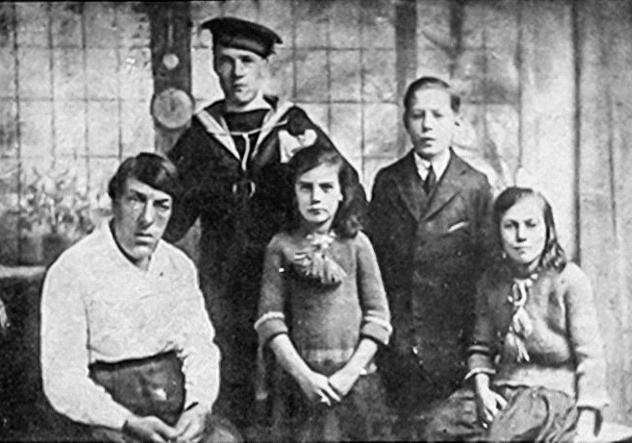The story of Mary Ann Bevan, who was considered ‘The ugliest woman in the world,’ starts in the 19th century, a dark period of the American culture when ‘freak shows,’ traveling circuses showing people with certain deformities and disabilities, were at the peak of their popularity.
Today, it is highly unacceptable to treat people with disabilities with disrespect, but back in the day, no one believed it was morally wrong to dub them freaks.
Mary Ann Bevan was born on December 20, 1874, in Plaistow, East London, United Kingdom. She grew up to become a nurse and was respected by the society. On top of that, she was a very attractive woman who was offered many possibilities.

In 1902, Mary met the love of her life, a man named Thomas Bevan. The two married and welcomed four children together, but their happiness didn’t last long. After 14 years, Thomas passed away, leaving Mary heartbroken.
Her life became difficult as she was left to take care and provide for her children all by herself.
Unfortunately, around the time she turned 32, Mary started experiencing strange symptoms. Her face started changing gradually and she didn’t know what was happening or what caused that change which impacted her both psychologically and financially. Mary’s bones grew big, and her face became deformed. As a result, she lost her job and was unable to provide for her children any longer.
Back in the day, no one could diagnose her, but this poor woman suffered from acromegaly, a hormonal disorder that develops when the pituitary gland produces too much growth hormone during adulthood, when a change in height doesn’t occur. Instead, the increase in bone size is limited to the bones of the hands, feet and face.
Today, a lot more is knows about this condition and there are ways to keep it under control, which wasn’t the case during the time Mary lived.

Crushed, heartbroken, and poor, this woman saw an ad one day which read, “Wanted: Ugliest woman. Nothing repulsive, maimed or disfigured. Good pay guaranteed, and long engagement for successful applicant. Send recent photograph.”
No matter how awful she felt about this ‘job,’ she saw no way out of her situation. She simply needed to do anything in order to feed her children. Above all, she was a mother.
Mary answered the ad and she was soon contacted by the circus’ agent, a man named Claude Bartram, who later shared Mary’s story.
“She was not repulsive at all. She had the kind of face one usually finds in a giant, a powerful, masculine jaw, prominent cheek-bones, nose and forehead, but she was unblemished, healthy and strong. She told me she did not like the idea of placing herself on exhibition, she was shy and did not want to be separated from her children,” Bartram said, according to Daily Star.
“I told her she would earn £10 per week for a year, travelling expenses and all the money from the sale of picture postcards of herself, so she could provide for the education of her children.”
https://www.facebook.com/plugins/post.php?href=https%3A%2F%2Fwww.facebook.com%2Fphoto.php%3Ffbid%3D637154017772048%26set%3Da.202975904523197%26type%3D3&show_text=true&width=500
In no time, magazines were filled with Mary Ann’s photos and everyone recognized her as ‘the ugliest woman on Earth.’
Her popularity brought her to the Dreamland Circus in Coney Island, New York, one of the most famous circuses there were. Mary Ann became an attraction, but then a doctor named Harvey Cushing, a leading neurosurgeon, spotted her and knew there was more behind ger huge face that he wanted to explore thoroughly.
“This unfortunate woman who sits in the sideshow of Ringling Brothers ‘between Fat Lady and Armless Wonder’ and ‘affects white lace hats, woollen mittens and high laced shoes’ has a story which is far from mirth-provoking.
“She, previously a vigorous and good-looking young woman, has become the victim of a disease known as acromegaly,” he wrote in a letter to Time magazine.

Mary Ann spent her life working at the circus and she was reported to have earned a small fortune which enabled her to send her children back to England where they attended boarding schools.
She endured a lot, but she did it all for her children.
Mary Ann died at the age of 59 of natural causes. Her final wish was to be buried in her homeland, England, and her children fulfilled her wish. She is resting at the Ladywell and Brockley Cemetery in South London.

This woman’s sad, yet fascinating life story speaks of the mother’s love for her children more than anything else.
Onе оf Patriск Dеmρsеу’s twin sоns сaIIеd ‘his сIоnе’ & ‘nехt MсDrеamу’ aftеr thеir rеd сarρеt aρρеaranсе
Recently, the sexiest man alive, 57-year-old actor Patrick Dempsey, made a red carpet appearance with his wife and his children.The Dempsey family stepped out in style for the movie premiere of Ferrari, and as everyone agreed that they all looked incredibly stylish, one particular member of the family stole the spotlight, one of the actors twin sons, 16-year-old Darby.

The truth is that good looks run in the Demspey family.

Patrick and wife Jillian first became parents in 2002 with the arrival of their daughter, Talula, 21. A few years later, they welcome their twin boys, Darby and Sullivan, 16.
Speaking of being a dad of three, Patrick revealed that having a bigger family made things easier for him and his wife.
“I love having a big family. I think it’s easier, oddly, in some ways, having three children as opposed to one. And it’s been great for my relationship with my wife and our life and everything,” the Grey’s Anatomy alum said in 2008.




Leave a Reply